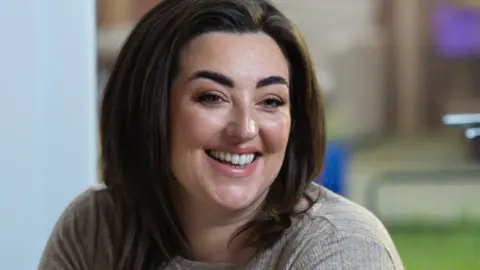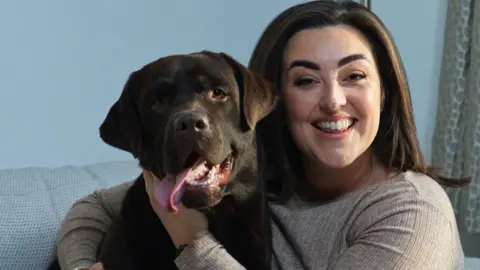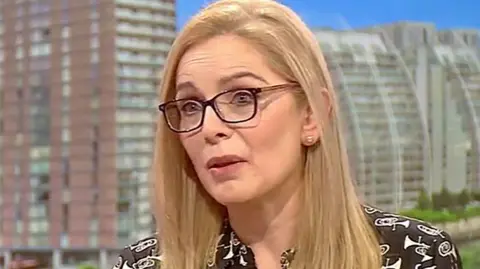 Phil Tragen/The Christie/PA Media
Phil Tragen/The Christie/PA MediaThe first patient in the UK with advanced bowel cancer to receive a liver transplant after the disease spread to it has said she had been given “a second chance at life”.
Bianca Perea, a 32-year-old trainee lawyer from Wigan in Greater Manchester, had the pioneering operation in the summer of 2024.
Her liver transplant was judged to be a huge success, meaning that following other treatments including targeted drug therapy, chemotherapy and surgery, Ms Perea no longer has any signs of cancer.
She said: “To go from being told I’d only have a short time to live to now being cancer-free is the greatest gift.”
Ms Perea was 29 when she first visited her GP after feeling constipated and bloated.
After being referred to hospital for tests, she was given the devastating news in November 2021 that she had stage four bowel cancer, which had spread to all eight segments of her liver.
She said: “I actually didn’t have really bad symptoms at all. I’d noticed a change in my bowel habits and also bloating and a little bit of pain in my stomach.”
 Phil Tragen/The Christie/PA Media
Phil Tragen/The Christie/PA MediaMs Perea was referred to The Christie NHS Foundation Trust’s local treatment centre in Wigan in early December 2021.
There, she had 37 rounds of a targeted drug called panitumumab as well as chemotherapy for two-and-a-half years.
She had an excellent response to the treatment, which meant she could have surgery in May 2023 to remove her bowel tumour.
However, scans showed she still had tumours in her liver, which could not be removed.
Nevertheless, because her response to chemotherapy had been so good, and her bowel cancer was seemingly gone, doctors began to consider a liver transplant.
‘Positive outcome’
Ms Perea was added to the transplant list in February 2024.
A match was found and she received her new liver at Leeds Teaching Hospitals NHS Trust.
She said: “Within four weeks of going under the knife, I was able to drive and walk the family dogs, it was really quite incredible.
“I’ve been given a second chance at life and I’m going to grab it with both hands. I am so grateful to the family who agreed to donate their loved one’s liver.”
She added it was “a blessing” that her donor has not only helped her, but been a part of medical history.
She said she was looking forward to going on holiday this year and was working on improving her fitness.
“My liver is doing really well,” she said.
“I get tests on that, and I’ve just had my second scan and that’s all clear, so it’s really good.”

Dr Kalena Marti, who was Ms Perea’s oncologist at The Christie, said: “To see that Bianca has had such a positive outcome is wonderful.
“When we looked at the tumour cells in her liver after it had been removed, they weren’t active.
“This is excellent news, and we hope this means that the cancer won’t come back.”
She added that while liver transplants “won’t be an option for everybody”, the success of Ms Perea’s treatment offered “more hope” to others.
Dr Marti added: “Advanced bowel cancer is complex and there are lots of different types of the disease, so what works for one person might not work for another.
“As a result, it’s important we continue to develop new treatments.”
Dr Ian Rowe, honorary consultant hepatologist at Leeds Teaching Hospitals NHS Trust, said: “I’m delighted Bianca has responded so well to the treatment and that she is now cancer-free.
“We are, of course, indebted to the family of the organ donor – as is made clear with Bianca’s case, organ donation saves lives.”
He also sounded a cautionary note, however.
“I think hope is important but the reality is this will be a treatment for a small proportion of people.
“For those people it will be the right thing, and we think it will work well.
“The number of people who have been transplanted like this is still very small internationally so we are all still learning about what those rules should be.
“In time they will change and we will learn which patients will do better so we can pick those people better.”
‘Selflessness’
An NHS Blood and Transplant spokesman said: “The waiting list for an organ transplant is the highest it has been in a decade.”
He said organ donation “saves lives” and described donors and their families as “truly inspirational”.
He said he hoped “the story of the donation that changed Bianca’s life will inspire people to confirm their decision to donate on the NHS Organ Donor Register – it means your family will be certain that you want to be an organ donor.”
British Liver Trust chief executive Pamela Healy said: “This pioneering liver transplant offers new hope for people living with advanced bowel cancer.
“Transplantation is only made possible by the selflessness of organ donors and their families. Tragically, hundreds of people in the UK die each year while waiting for a liver transplant due to the shortage of available organs.
“We urge everyone to confirm their wishes to become an organ donor and discuss them with loved ones.”
